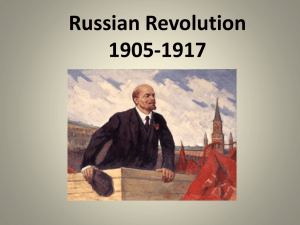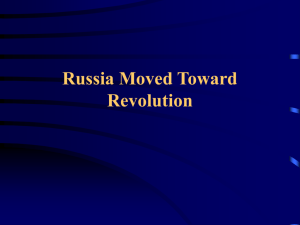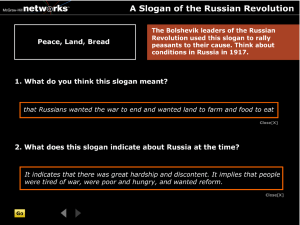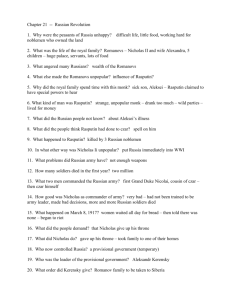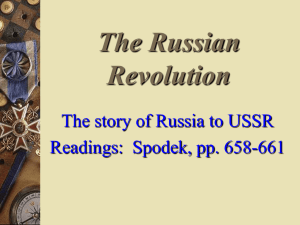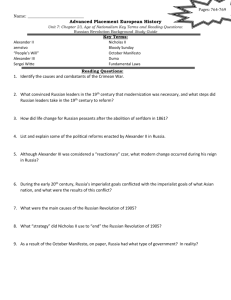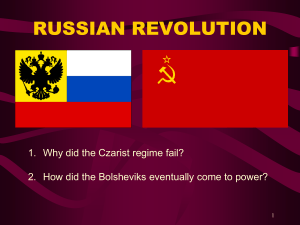WWI & The Russian Revolution
advertisement
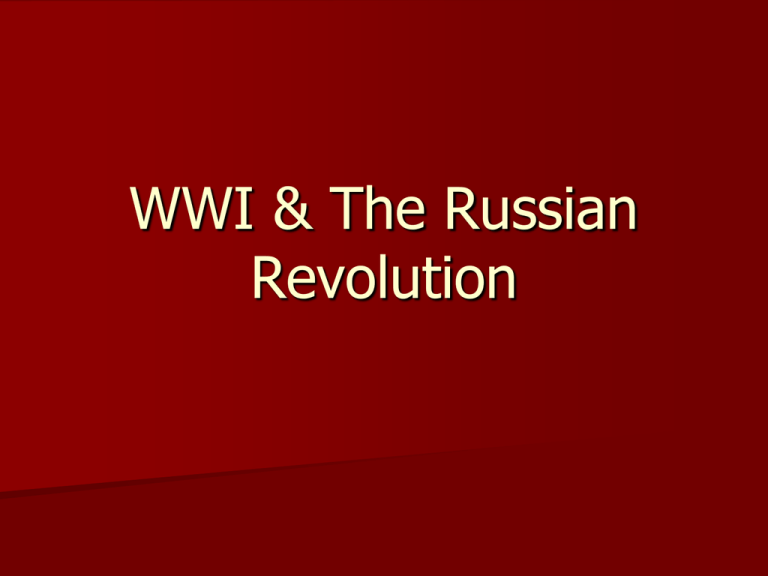
WWI & The Russian Revolution A Few Quick Reflections What types of economic, political and social conditions characterized late 19th Century European nations? Which nations were dominant? What has been the long term impact of 19th Century European Imperialism? The MAIN Causes of War Militarism Alliance System Imperialism Nationalism Spark that started the war was the assassination of Archduke Ferdinand of Austria by Gavrilo Princip of the “Black Hand The Origins of WWI A. Nationalism 1. Pan-German movement = seeking to unite all German speaking peoples 2. Pan-Slavic movement. Austria-Hungary contains both. B. Militarism and Alliances 1. glorification of armed strength – competition 2. Triple Alliance = Germany, Austria-Hungary, and Italy 3. Triple Entente = Britain, France, and Russia The Alliance System http://www.spartacus.schoolnet.co.uk/FWWschlieffenP.htm 1905 Schlieffen Plan http://www.spartacus.schoolnet.co.uk/FWWschlieffenP.htm WWI Begins France assumed that Germany would attack through Alsace & Lorraine… Germany came strong through Belgium according to the Schlieffen Plan… came close to Paris before being bogged down into a dreaded Two Front War http://www.pbs.org/greatwar/maps/ http://www.pbs.org/greatwar/maps/ Trench Warfare 1. Covered with barbwire and land mines, centred by “no-man’s land” a death zone. 2. Front - Stretched 600 kilometres from the North Sea to the Swiss border. 3. Battle of the Somme - Entente suffered 60,000 deaths in a day http://www.albany.edu/jmmh/vol1no1/ww1.html What about Russia? George V of England & Tsar Nicholas II of Russia The Romanov Family II. Political chronology 2. Nicholas II (1894-1917) -Social and political challenges II. Political chronology: Nicholas II 1905 revolution II. Political chronology: Nicholas II 1905 revolution Reforms: -October Manifesto 1905 -1906 Fundamental laws: civil liberties, legislative Duma -Social reforms (land reform; unions) IV. Nicholas II (1894-1917) -Personal life IV. Nicholas II (1894-1917) -Love of military culture Prince Charles & Russia Empress Alexandra http://www.alexanderpalace.org/palace/ctcostume.html Life of the Romanov Family Tsarskoye Selo Billiard Hall Winter Palace City Life Grigorii Rasputin Rasputin was seen by many as a “puppet master” controlling Nicholas and Alexandra. Rasputin dominating Russian Court There lived a certain man in Russia long ago He was big and strong, in his eyes a flaming glow Most people looked at him with terror and with fear But to Moscow chicks he was such a lovely dear He could preach the bible like a preacher Full of ecstacy and fire But he also was the kind of teacher Women would desire "This man's just got to go!" declared his enemies But the ladies begged "Don't you try to do it, please" No doubt this Rasputin had lots of hidden charms Though he was a brute they just fell into his arms Then one night some men of higher standing Set a trap, they're not to blame "Come to visit us" they kept demanding And he really came RA RA RASPUTIN Lover of the Russian queen There was a cat that really was gone RA RA RASPUTIN Russia's greatest love machine It was a shame how he carried on RA RA RASPUTIN Lover of the Russian queen They put some poison into his wine RA RA RASPUTIN Russia's greatest love machine He drank it all and he said "I feel fine" He ruled the Russian land and never mind the czar But the kasachok he danced really wunderbar In all affairs of state he was the man to please But he was real great when he had a girl to squeeze For the queen he was no wheeler dealer Though she'd heard the things he'd done She believed he was a holy healer Who would heal her son RA RA RASPUTIN Lover of the Russian queen They didn't quit, they wanted his head RA RA RASPUTIN Russia's greatest love machine And so they shot him till he was dead (Spoken:) Oh, those Russians... (Spoken:) But when his drinking and lusting and his hunger for power became known to more and more people, the demands to do something about this outrageous man became louder and louder. By: Boney M The Death of Rasputin Other Fascinating Facts About Rasputin and the Romanovs: •Alexandra was one of the favourite grand-daughters of Queen Victoria of Great Britain, who was third cousin to Nicholas. Alexandra was one of Victoria's many grand-daughters who passed on hemophilia, which ran in the family, to their children. •Tsar Nicholas II and Kaiser Wilhelm of Germany, with whom Russia went to war, were cousins. •Seventies pop group Boney M summed up Rasputin's exploits very nicely: 'Most people looked at him with terror and with fear / But to Moscow chicks he was such a lovely dear'. The instrumental version of that song is what you hear playing in the background. •One theory regarding Rasputin's ability to stop Alexei's bleeding is that he used a sort of hypnosis to slow the boy's heartbeat, reducing the force with which the blood was circulated in his body •News of Rasputin's death was celebrated, and the murderers were seen as heroes who had saved Russia from the influence of the German Alexandra and the mad monk Rasputin. •Nicholas sent Rasputin's murderers into exile. Ironically, this punishment eventually saved them from imprisonment and assassination by the Bolsheviks. •Rasputin's corpse was exhumed and burned by a mob during the February Revolution of 1917. http://www.worsleyschool.net/socialarts/rasputin/page.html Abdication of Nikolai II, March 15, 1917 By the Grace of God, We, Nikolai II, Emperor of All the Russias, Tsar of Poland, Grand Duke of Finland, and so forth, to all our faithful subjects be it known: In the days of a great struggle against a foreign enemy who has been endeavouring for three years to enslave our country, it pleased God to send Russia a further painful trial. Internal troubles threatened to have a fatal effect on the further progress of this obstinate war. The destinies of Russia, the honour of her heroic Army, the happiness of the people, and the whole future of our beloved countrydemand that the war should be conducted at all costs to a victorious end. The cruel enemy is making his last efforts and the moment is near when our valiant Army, in concert with our glorious Allies, will finally overthrow the enemy. In these decisive days in the life of Russia we have thought that we owed to our people the close union and organisation of all its forces for the realisation of a rapid victory; for which reason, in agreement with the Imperial Duma, we have recognized that it is for the good of the country that we should abdicate the Crown of the Russian State and lay down the Supreme Power. Not wishing to separate ourselves from our beloved son, we bequeath our heritage to our brother, the Grand Duke Mikhail Alexandrovich, with our blessing for the future of the Throne of the Russian State. We bequeath it our brother to govern in full union with the national representatives sitting in the Legislative Institutions, and to take his inviolable oath to them in the name of our well-beloved country. We call upon all faithful sons of our native land to fulfil their sacred and patriotic duty of obeying the Tsar at the painful moment of national trial and to aid them, together with the representatives of the nation, to conduct the Russian State in the way of prosperity and glory. May God help Russia. Death of the Romanovs Did anyone Survive? Marie Alexei The Mystery of Anna Anderson Anastasia 1998: Romanov Remains Alexei & Marie or Anastasia still Missing? Road to Disaster (1914-1918) 1914 July 19 Germany declares war against Russia.Start of World War I. 1915 May 2 Start of large-scale German invasion on the eastern front. 1915 August 23 Emperor Nicholas takes over command in place of Grand Duke Nikolai Nikolaevich. 1916 December 16-17 Murder of Rasputin. 1917 February 23 Start of mass demonstrations in Petrograd. 1917 February 27 Power in Petrograd turned over to the interim committee of the State Duma, led by Rodzyanko. 1917 March 2 Signing by Nicholas of the abdication manifesto in Pskov. 1917 March 9 Nicholas returns from Headquarters to Tsarskoye Selo. 1917 August 1-6 Nicholas and his family transferred from Tsarskoye Selo to Tobolsk by decision of the interim government. 1918 April 26-30 Nicholas, Alexandra Fyodorovna and daughter Maria transferred from Tobolsk to Yekaterinburg. 1918 May 23 Olga, Tatyana, Anastasia and Alexis arrive in Yekaterinburg. 1918 July 16-17 Imperial family executed in the basement of the home of mining engineer Ipatiev in Yekaterinburg. The Russian Revolution 1917 Petrograd shooting Lenin It Has Come to Pass by S. Lukin Why? Who/what is to blame? War? Why? Who/what is to blame? Have’s and Have Not’s… Interpretation: why? who/what is to blame? Social discontents? May Day 1917 Why? Who/what is to blame? Opposition parties and leaders? – Bolsheviks: “Bread, Peace, Land” Lenin III. The Bolsheviks’ dilemma Coming to power: draw support from popular opinion and values In power, having to contend with – Ideas and values about the revolution – Class suspicion of all elites – State must serve interests “Days of monstrous contradiction” Vladimir Lenin (1870-1924) Lenin I. The Ambivalence of Bolshevism, 1917-1921 1. Uncertainty and ambivalence 2. Leninist conception of power Lenin, 1918 2. Leninist conception of power: a) “Commune state” – “creative enthusiasm of the revolutionary classes” who can perform “miracles” – “Take matters into your own hands from below, waiting for no one.” -- Lenin Rosta Window, 1921: “The Dead of the Paris Commune have Risen under the Red Banner of the Soviets” 2. Leninist conception of power: b) Authoritarianism: discourse of control, ruthless suppression, iron discipline, dictatorship “A Year of Proletarian Dictatorship” I. The Ambivalence of Bolshevism, 1917-1921 3. Early Bolshevik political practice: Emancipatory/libertarian measures - Land reform Workers control Self-determination Recruitment Zhenotdel (Women’s section of Communist Party) I. The Ambivalence of Bolshevism, 1917-1921 3. Early Bolshevik political practice: Centralizing and authoritarian policies – One-party government – Press control – Cheka (Extraordinary Commission for the Struggle with Counterrevolution, Sabotage, and Speculation) – Controlling economy and labor I. The Ambivalence of Bolshevism, 1917-1921 4. Civil War (1918-1920) – Authoritarianism, coercion, violence – Emancipatory idealism and experimentation I. The Ambivalence of Bolshevism, 19171921 5. Devastation by 1921 – Economic collapse – Social rebellion (Kronstadt) – Dissidence within party Help II. NEP Society (1920s) 1. The New Economic Policy: mixed economy – State: “commanding heights” – Society: small scale production and commerce III. A contradictory society 1. Economic progress 2. Cultural development 3. Civil society revitalized 4. Repression and control 5. Conflicts and struggles (class, generation) 6. Crime, homelessness, decadence public life, popular culture III. A contradictory society 7. Idealism: efforts to transform everyday life – Communes – Women’s emancipation – “Orchestra without a Conductor” – “Down with Shame” “Woman! Learn to Read!” “Hey, Mama! If you knew how to read, you could help me!” V. Modernism Machines and electricity “Iron Messiah” (Vladimir Kirillov) There he is, the savior… In the sparkle of suns of electricity… There he walks o’er the abyss of seas… The mountains give way before him… The earth's poles together are brought… To the world he brings a New Sun… He destroys thrones and prisons … He calls the peoples to eternal fraternity… “Literacy is the Path to Communism,” 1920 The Soviet Union… THE TREATY OF BREST-LITOVSK, MARCH 1918 ARTICLE 1. Germany, Austria-Hungary, Bulgaria, and Turkey on the one hand and Russia on the other declare that the condition of war between them bas ceased. They have decided to live in peace and accord in the future. ARTICLE 2. The contracting parties will refrain from all agitation or propaganda against the governments or all state and military institutions of the other side. . . . ARTICLE 3. The territories lying to the west of the line determined by the contracting powers and which formerly belonged to Russia will no longer be under her sovereignty. ... Russia gives up all interference in the internal affairs of the said countries. Germany and Austria-Hungary intend to determine the future fate of the said territories with the consent of their inhabitants. ARTICLE 4. Germany is ready, as soon as general peace is established and Russian demobilization will have completely taken place, to vacate the territories lying east of the line mentioned in ... article 3. ... Russia will do all in her power to have the provinces of eastern Anatolia promptly evacuated and returned to Turkey. The territories of Ardakhan, Kars and Batum will also be cleared without delay of Russian forces... . ARTICLE 5. Russia will, without delay, proceed to demobilize her army, including those army units newly formed by her present government. Moreover, Russia will either bring her warships into Russian ports and keep them there until general peace is concluded, or will disarm them at once.... ARTICLE 6. Russia undertakes to conclude peace at once with the Ukrainian people's republic and to recognize the treaty of peace between the state and the powers of the Quadruple Alliance. The territory of the Ukraine must be, at once, cleared of Russian troops and the Russian Red Guard. Russia ceases all agitation or propaganda against the government or the public institutions of the Ukrainian people's republic. Estonia and Lithuania must also be immediately cleared of Russian troops and the Russian Red Guard... Finland and the Aland Islands will also be, without delay, cleared of Russian troops and the Russian Red Guard and Finnish ports of the Russian fleet and of Russian naval forces.... Russia ceases all agitation or propaganda against the government or public institutions of Finland.... ARTICLE 7. ... the contracting parties bind themselves to respect the political and economic independence and the territorial inviolability of Persia and Afghanistan. ARTICLE 8. The prisoners of war of both parties will be allowed to return home... . ARTICLE 9. The contracting parties mutually renounce all indemnifications for their war expenses, that is, for government expenses for conducting the war, ... including all requisitions made in the enemy's country. [ARTICLES 10-13 deal with technical matters] ARTICLE 14. The present peace treaty must be ratified. Exchange of ratification documents must take place in Berlin as soon as possible. The Russian Government binds itself to execute the exchange of ratification documents ... in the course of two weeks ... . Lenin Today
